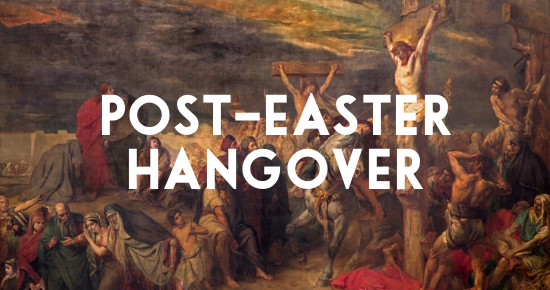Easter has far past, churches this past weekend were empty and silent (comparatively); the pastors were exhausted (when are they not though?); congregants are back to their usual lives awaiting the next Christmas eve service or mass to attend with their family.
It’s a post-Easter hangover.
As it’s popular for many evangelical congregations to offer “alter calls” on Easter Sunday some of you in an emotionally manipulated reckless abandonment might have even given/re-committed your life to Christ. It felt good in the moment, but now there are deep second-guessing questions coming out of nowhere. If not, then allow me to impose a thoughtful yet very important and vital question all Christians must consider:
Did the Resurrection Really happen? Like, the literal, physical, bodily resurrection of Jesus Christ… I mean, probably not.
BUT, before anyone casts that electronic stone in the form of a comment, forever anathematizing me from their RSS feed (which, if I’m not on yours already then…) just read to the end, then comment away! Consider this:
- Historicity does not dictate meaning and/or interpretation;
- History cannot be proven; we can only verify what most probably happened;
- Natural law is not an impervious barrier our theological interpretation(s) face when confronting this highly improbable historical event.
Since we’re so incredibly open-minded as Christians let’s acknowledge the rather inane logical in which our faith leads us to let go of all rationality and deny perfectly logical, empirically verifiable explanations from historians and scientists that would otherwise show us wrong.
Even when men with PhD’s write books building a case for the resurrection citing the five minimal facts we only have to consider that we don’t know the dates in which the gospels were written; we don’t know who wrote these gospels; we do know that these gospels have been continuously redacted and edited; we do know that there are more variances and discrepancies in the NT than there are words. Sure, let’s say there were 500 eye-witnesses to Christ Jesus post-crucifixion, but I’m sure I find over a thousand eye-witnesses still living today that claim to have seen Bigfoot or Nessie, the infamous Loch Ness monster.
But again, using the biblical narrative as your main source in proving the historicity of the resurrection is not only frustratingly annoying but common, really? #KenHam The gospels don’t even agree on the day in which Christ died (For instance Mark 14:12-16 compared to John 19:14, Jesus could not have died on both days; which day is it?).
I’m not trying to be an asshole, really, I’m just trying to empathize with the nonChristian person (i.e. everyone else). But, also, to create an intersectionality and a healthy inter-religious dialogue.
If the resurrection did not happen then what are its implications for us as Christians?
It does not mean the resurrection of Jesus did not happen; it merely means, in my own opinion, that the resurrection of Jesus was not physical; it was spiritual. Even if Jesus’ physical corpse was thrown to the dogs as Marcus Borg claims, even if the skeptics were correct in that His corpse was merely stolen by thieves, even if psychology explains the commonality of seeing loved ones after they’ve passed as mere hallucinations, I do believe in things that are unexplainable. Some call it supernatural, others call it mystical – I like to refer to it simply as unexplainable.
We’ve heard it said before, “The past is only a story in which we tell ourselves;” it’s neither here nor there, therefore, it cannot be proven. We only have present-day reconstructions of what supposedly used to be. This does not mean the past is irrelevant, neither does it mean that the stories in which we remember are untrue.
Perhaps, what the supposed eye-witnesses experienced was a psychological hallucination and/or coping mechanism in which due to overwhelming amounts of stress and trauma their brain produced a final moment with whom they called “Messiah.”
I will say this: personally, I don’t believe there was a physical resurrection in the basic understanding in which the typical modern Christian (Protestant & Catholic) believes there to have been.
It’s limiting.
If anything, I believe there was indeed a spiritual post-death interaction in which the apostles, and various eye-witnesses, experienced post-Jesus’ crucifixion. Whether or not it was a vision of a hallucination, I do not think it takes away the power of the cross or the legitimacy of his resurrection.
We live in a time and a day and age in which it’s hypothesized that although we only experience and perceive 4 dimensions while there are 6 more dimensions we go unaware of; astrophysicists hypothesize that subatomic particles might just be minutely vibrating “super-strings” of space; we’re being told by science that the observable universe is more than what we’ve previously been observing.
“Moreover, what would it mean to say that the risen Jesus is a physical/bodily reality? That he continues to be a molecular, protoplasmic, corpuscular being existing somewhere? Does that make any sense? How can the risen and living Jesus be all around us and with us, present everywhere, if he is bodily and physical?” – Marcus Borg
The more we learn, the more absurd life becomes and, the more absurd our conscious existence becomes the more possibilities I see in a rational argument for a being, some might refer to as “God” or, at the very least an “intelligent designer.”
Because, after all, why is there something, when there could have been nothing?

















